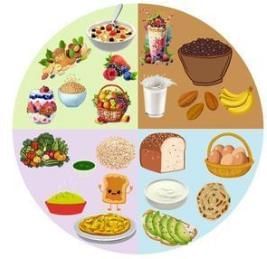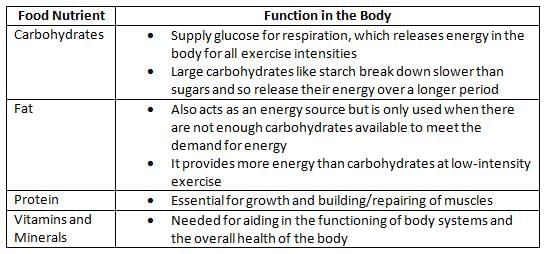Year 11 Exam > Year 11 Notes > Physical Education for GCSE/IGCSE > Nutrition
Nutrition | Physical Education for GCSE/IGCSE - Year 11 PDF Download
Reasons for Maintaining a Balanced Diet
- A balanced diet is defined as: A dietary plan that supplies all essential nutrients needed for optimal health.
- To attain a balanced diet, individuals must include a variety of food types to obtain all necessary nutrients.
- No single food provides all the nutrients the human body requires.
- The essential nutrients include:
- Carbohydrates
- Proteins
- Fats
- Fibre
- Vitamins
- Minerals
- Water
Balanced Diet Diagram
 There are several reasons why maintaining a balanced diet is crucial:
There are several reasons why maintaining a balanced diet is crucial:
- Excessive intake of saturated fats can result in fat accumulation in the body, potentially leading to obesity over time.
- Carbohydrates and sugary foods supply glucose for cellular respiration, boosting energy levels for physical activities like sports.
- Various nutrients are vital for fundamental metabolic processes in cells, including growth and maintaining water balance.
The Role of Carbohydrates, Fats, Proteins, and Vitamins/Minerals
Food Nutrients Table

- Each individual’s dietary needs vary based on factors such as age, gender, and activity levels.
- A typical balanced diet consists of:
- 55–60% carbohydrates
- 25–30% fats
- 15–20% proteins
The document Nutrition | Physical Education for GCSE/IGCSE - Year 11 is a part of the Year 11 Course Physical Education for GCSE/IGCSE.
All you need of Year 11 at this link: Year 11
FAQs on Nutrition - Physical Education for GCSE/IGCSE - Year 11
| 1. What are the main functions of carbohydrates in the body? |  |
Ans. Carbohydrates serve as the body's primary source of energy. They are broken down into glucose, which is used by cells for fuel. In addition to providing energy, carbohydrates are important for proper brain function and can help regulate blood sugar levels. They also play a role in the structure of cells and are involved in the synthesis of certain molecules.
| 2. How do fats contribute to overall health and energy use? |  |
Ans. Fats are essential for various bodily functions, including the absorption of fat-soluble vitamins (A, D, E, and K), hormone production, and providing insulation and protection to organs. They are a dense source of energy, supplying more than double the energy per gram compared to carbohydrates and proteins. Healthy fats, such as those from avocados, nuts, and fish, can support heart health and reduce inflammation.
| 3. Why are proteins important in a diet, and what roles do they play? |  |
Ans. Proteins are vital for building and repairing tissues, producing enzymes and hormones, and supporting immune function. They are made up of amino acids, which are the building blocks of the body's cells. Consuming adequate protein is crucial for maintaining muscle mass, especially during growth periods, and can help regulate appetite by promoting feelings of fullness.
| 4. What role do vitamins and minerals play in nutrition? |  |
Ans. Vitamins and minerals are essential micronutrients that support a wide range of physiological functions. Vitamins help in energy production, immune function, blood coagulation, and other metabolic processes, while minerals are important for bone health, nerve function, and muscle contraction. A balanced diet with a variety of fruits, vegetables, whole grains, and lean proteins can help ensure adequate intake of these nutrients.
| 5. How can a balanced diet incorporating carbohydrates, fats, proteins, and vitamins/minerals benefit overall well-being? |  |
Ans. A balanced diet that includes carbohydrates, fats, proteins, and vitamins/minerals is essential for maintaining optimal health. It provides the necessary energy for daily activities, supports growth and development, and promotes a healthy immune system. A varied diet can also help prevent chronic diseases, improve mood, and enhance cognitive functions, contributing to overall well-being.
Related Searches















